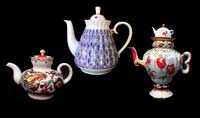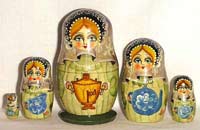Russian Tea Drinking Tradition
Tea is popular in many countries and each country has own traditions and preferences in drinking of tea. Russia is the country where tea-drinking formed into individual tradition. History of Russian tea-drinking ceremony has began int 1638 when Russian Tsar Michael Fedorovich got special diplomatic gift from Altyun-Khan, ruler of Mongolia. Till that time Russians did not know anything about tea and used to soft drinks based on honey.
In Russia tea is served after meals and during mid-afternoon breaks, a kind of English "five-o'clock-tea" with difference that this Russian "five-o'clock-tea" may occur in any part of day and in any place - in office, in a car, in a park. When friends visit somebody hosts invite them to have a cup of tea. This "cup of tea" is not just a tea but a lots of cookies, sandwiches, other meal. Each feast ends with tea-drinking with candies and cakes. Having come to Russia from Ukraine when tea drinking traditions are not so strong and widely spread, especially in the country area, as in Russia, I was very surprised at the party of occasion of somebody's birthday when after many shots of vodka when all guests were well drunk the mistress of the house served tea with a huge pie. I would prefer a glass of cold mineral water...
 Till present time when bagged tea got popular in the world Russians still prefer tea prepared in old classical way when tea is put into a tea-pot and then poured with boiling water - nothing special but only this way can provide good taste of tea. Every family has several porcelain tea-pots of different sizes and different decoration. Tea-pots with plain decoration are used for everyday tea-drinking, more festive tea-pots are use for more ceremonial feasts. The most valued porcelain items are those made at Lomonosov Porcelain Factory ( you can read about history of this factory at the "History of Lomonosov Porcelain Factory (LFZ)" page) because of high quality of porcelain and decoration.
Till present time when bagged tea got popular in the world Russians still prefer tea prepared in old classical way when tea is put into a tea-pot and then poured with boiling water - nothing special but only this way can provide good taste of tea. Every family has several porcelain tea-pots of different sizes and different decoration. Tea-pots with plain decoration are used for everyday tea-drinking, more festive tea-pots are use for more ceremonial feasts. The most valued porcelain items are those made at Lomonosov Porcelain Factory ( you can read about history of this factory at the "History of Lomonosov Porcelain Factory (LFZ)" page) because of high quality of porcelain and decoration.
There are some rules to prepare good tea. They say that water should be boiled till "sparkling boiling" when first air bubbles appeared. Water should be soft, hard water with much salts is not good for tea. A tea-pot is heated a little bit with some hot water. Then tea is put into the tea-pot - 1 tea-spoon for each person plus 1 for tea-pot - classical recipe. After 3-4 minutes tea is ready. Some concentrated tea is pored into cup in accordance with preferences of a person, the rest of cup is filled with hot water. Russian seldom serve tea with milk or cream, they consider that milk change  taste of the tea. Often, especially in past, tea is served in glass which are put into special glass holders which are made of metal - silver, bronze, so called German silver (special Cu-Ni-Zn alloy) and decorated with engraved pictures and enamel elements. Till this time tradition of serving of tea in such glasses with glass-holders in long-distance trains. Often tea is served with slices of lemon.
taste of the tea. Often, especially in past, tea is served in glass which are put into special glass holders which are made of metal - silver, bronze, so called German silver (special Cu-Ni-Zn alloy) and decorated with engraved pictures and enamel elements. Till this time tradition of serving of tea in such glasses with glass-holders in long-distance trains. Often tea is served with slices of lemon.
In past Russian tea party was quite pictures and colorful, that is why it became an often subject of painting on lacquer boxes, trays, porcelain pieces. Many different snacks were served during tea party. In past water was boiled in special devices - samovar. The samovar was the central symbol of the Russian tea ceremony. This is an unique invention that combines a kettle with heating chamber inside. Samovar became an essential element of each housekeeping. There were many different types of samovars - large for public restaurants, small and compact for travels, normal size for everyday use, brass for regular income families, silver and well decorated for rich families.
Besides different cakes and cookies all sorts of jams and confiture are served. Honey is most delicious addition to tea. Jam and honey are not put into cup or glass with tea but are served in a kind of bowl or special vase and then each participant of tea party put portion into personal little plate or bowl and then eats by a tea spoon. Often white bread or roll is offered, in this case loaves of bread are spread with jam or honey. Of course fresh butter is served - just in case to spread onto bread.
Many time I received questions like: "I have a friend who come from Russia. I want to make a special "Russian gift". What would you advise?" The most universal "very Russian gift" is a gift related to tea ceremony - tea set, just a fine tea cup, good porcelain tea-pot, maybe collection of different teas. Such gift will be appropriate for any person with Russian roots.
Collected and edited by Michael Terletski
